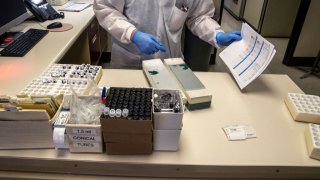
UCLA researchers and colleagues have found that there was a significant increase in patients with coughs and acute respiratory failure at UCLA Health hospitals and clinics beginning in late December, suggesting that COVID-19 may have been circulating in the area months before the first definitive cases in the U.S. were identified, it was announced Thursday.
This sudden spike in patients with these symptoms, which continued through February, represents an unexpected 50% increase in such cases when compared with the same time period in each of the previous five years.
The findings, the study authors say, demonstrate the importance of analyzing electronic health records to monitor and quickly identify irregular changes in patient populations. The researchers' approach, in which they focused not only on hospitalization data but also on data from outpatient settings, may help epidemiologists and health systems detect future epidemics sooner.
The study appears in the peer-reviewed Journal of Medical Internet Research.
"For many diseases, data from the outpatient setting can provide an early warning to emergency departments and hospital intensive care units of what is to come,'' said Dr. Joann Elmore, the study's lead author and a professor of medicine in the division of general internal medicine and health services research at the David Geffen School of Medicine at UCLA. "The majority of COVID-19 studies evaluate hospitalization data, but we also looked at the larger outpatient clinic setting, where most patients turn first for medical care when illness and symptoms arise.''
As scientists and doctors continue to learn more about SARS-CoV-2, the virus that causes COVID-19, health systems and public health agencies are also attempting to predict and monitor cases. Analyzing electronic patient records, the researchers say, could help health authorities more effectively identify and control outbreaks like the current pandemic, which has killed hundreds of thousands worldwide and disrupted billions of lives.
"The pandemic has really highlighted our need for agile health care analytics that enable real-time symptom and disease surveillance using electronic health records data,'' said Dr. Michael Pfeffer, a study co-author and chief information officer for UCLA Health. "Technology, including artificial intelligence powered by machine learning, has further potential to identify and track irregular changes in health data, including significant excesses of patients with specific disease-type presentations in the weeks or months prior to an outbreak.''
Local
Get Los Angeles's latest local news on crime, entertainment, weather, schools, COVID, cost of living and more. Here's your go-to source for today's LA news.
The researchers evaluated more than 10 million health system and patient visit records for UCLA Health outpatient, emergency department and hospital facilities, comparing data from the period between Dec. 1 and Feb. 29 - the months prior to increased public awareness of COVID-19 in the U.S. -- with data from the same period over the previous five years.
They found that outpatient clinic visits by UCLA patients seeking care for coughs increased by over 50% and exceeded the average number of visits for the same complaint over the prior five years by more than 1,000. Similarly, they discovered a significant excess in the number of patients seen in emergency departments for reports of coughs and of patients hospitalized with acute respiratory failure during this time period. These excesses remained even after accounting for changes in patient populations and seasonal variation, according to UCLA.



